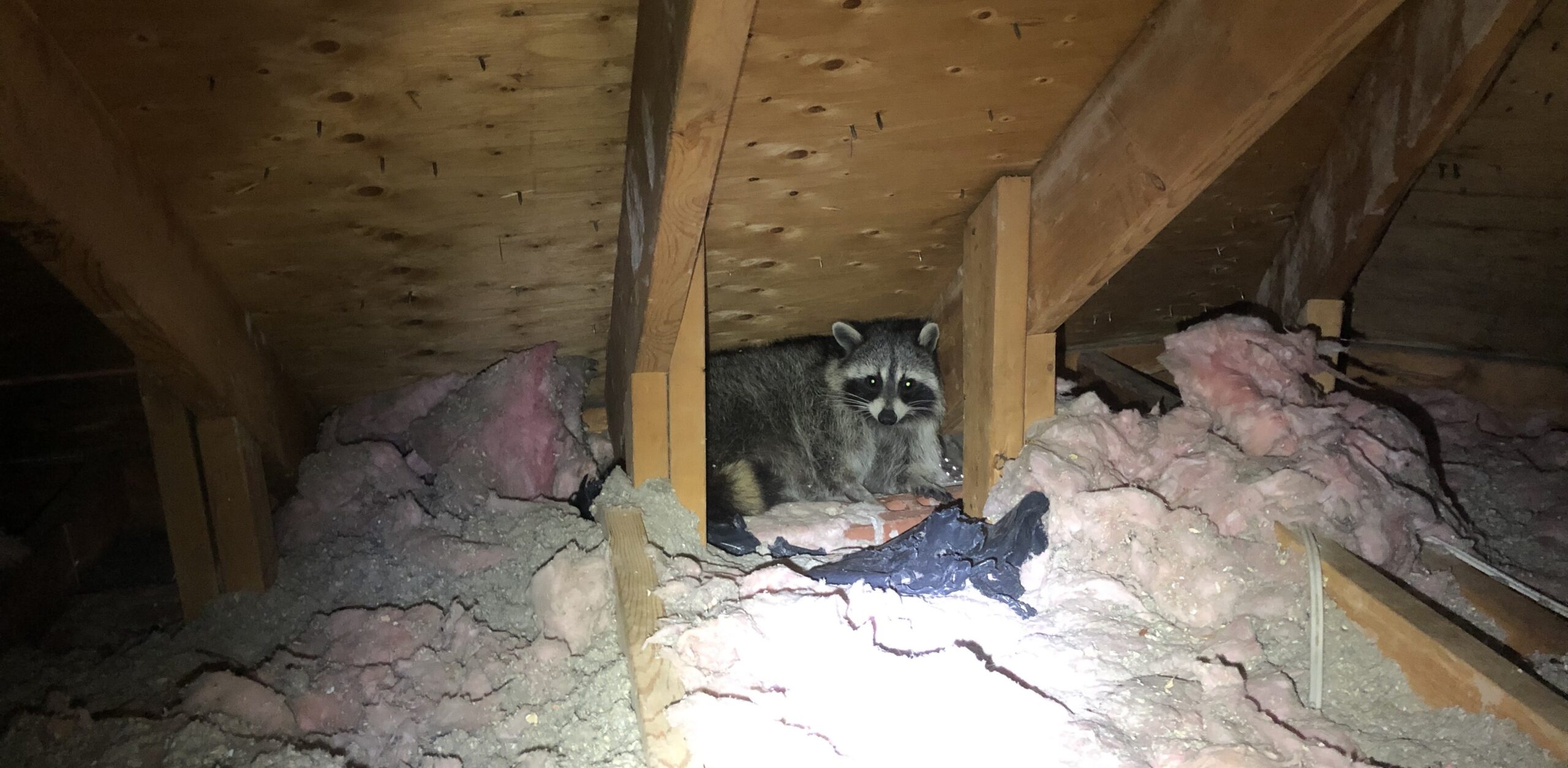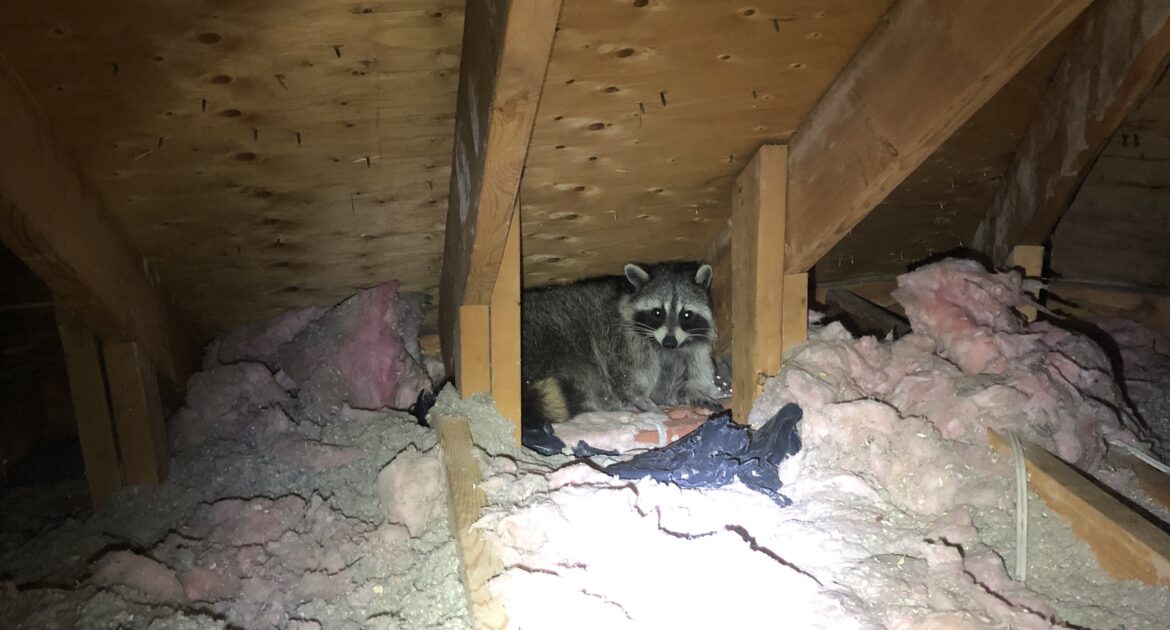Picture this: a blazing summer day in Pickering, with temperatures climbing higher by the hour. While we enjoy the relief of fans, AC, and ice-cold drinks, have you ever stopped to think about how wildlife in summer heat handles the sweltering sun? Specifically, how do raccoons stay cool during the summer heat? Raccoons are resourceful by nature, and their summer habits offer fascinating insights into how animals survive the hottest months.
Raccoon summer behaviour is all about staying smart and efficient. From adjusting their activity schedules to finding creative ways to cool off, raccoons know how to make the best of their surroundings.
At Skedaddle Humane Wildlife Control in Pickering, we’ve seen how these intelligent animals adapt to heat while often seeking comfort close to human homes. Read on to explore how raccoons beat the summer heat.
Resting During the Day
Raccoons are naturally nocturnal, meaning they’re most active when the sun goes down. This behaviour is not just about avoiding humans; it’s also a way to avoid heat. By resting during the day, raccoons conserve energy and stay cool, venturing out only when the air is cooler at night.
You might notice raccoons napping in shaded corners or quiet areas around dusk or dawn. Their ability to shift their activity to night-time hours allows them to avoid the hottest part of the day.
Cool, Shady Hideouts
Finding shelter is a key way raccoons beat the heat. They’ll seek out spots that are naturally cooler and tucked away from direct sunlight. Common places raccoons hide in summer include:
- Under Decks or Porches: These areas are shady and well-ventilated, making them perfect retreat spots. The smaller, enclosed space creates a natural cooling effect, helping raccoons avoid direct sunlight and stay comfortable during the hottest hours. Your deck or porch might also offer a layer of protection from predators, letting raccoons rest without worry. If there are any gaps or openings under your porch, it’s likely they’ll be drawn to the cool airflow these spots provide.
- Dense Bushes and Treetops: Thick vegetation provides much-needed protection from direct sunlight. Bushes and treetops act like natural umbrellas, blocking out the sun’s rays and creating cool spaces for raccoons to relax. These leafy areas are also perfect for raccoons to remain hidden while staying close to food or water. High in the treetops, raccoons can avoid the summer heat and potential dangers on the ground, making it one of their favourite hangout spots.
- Garages or Sheds: While not ideal for homeowners, raccoons will look for cool, quiet spaces if entry points are left open. These spots mimic a natural den with added insulation, protecting raccoons from both heat and sudden weather changes. Garages or sheds are particularly attractive because they’re often dark, ventilated, and rarely disturbed during the day. If doors are left ajar or there are cracks and gaps, raccoons can easily sneak in and make themselves at home. Sealing these entry points is important if you want to avoid unwelcome guests.
Raccoons are drawn to these locations because they offer a comfortable escape from the summer sun. Sealing off access to your property can ensure they don’t make themselves at home where they don’t belong.
Using Nearby Water Sources
Water is essential for raccoons to stay hydrated and cool during the summer. They often rely on natural water sources like ponds, streams, or lakes to drink and sometimes even splash around to lower their body temperature.
But raccoons are opportunistic and might venture into backyards for water as well. Here’s how they use water during hot days:
- Drinking from pools, fountains, or birdbaths to stay hydrated.
- Playing in shallow water areas to cool off.
- Tipping over pet water bowls if no other source is immediately available.
If you’ve noticed overturned water dishes or signs of digging near your pool, a raccoon might have been trying to find relief from the heat.
Grooming as a Cooling Trick
Raccoons can’t sweat like humans, but they’ve got other ways to regulate their body temperature. Grooming is one clever method. By licking their fur, they lay down a layer of saliva that cools their skin as it evaporates.
On hot summer days, you might see raccoons spending extra time grooming. It’s a simple yet effective way they combat the rising temperatures. This behaviour, combined with their smart habits, helps them keep their cool.
Ventilation Is Key
Raccoons are surprisingly skilled at finding areas with good airflow. Attics or crawl spaces are ideal for them in the summer because these places often have a naturally cooler temperature and some level of ventilation. They might enter through gaps, vents, or any other small opening they can squeeze into.
That’s where we, at Skedaddle Humane Wildlife Control, come in. If a raccoon has taken over your attic, our one-way door systems allow them to leave but prevent them from re-entering. It’s a safe and effective way to guide them back to the wild without harming your home.
Conserving Energy
Another aspect of raccoon summer behaviour involves conserving energy. During particularly warm days, raccoons reduce their activity to avoid overheating. Instead of wandering around, they’ll lay low, often in high tree branches or hidden dens.
By focusing only on key tasks like eating and drinking, raccoons avoid wasting energy during the day. Their ability to rest and conserve makes them even more adaptable to summer heat.
How Fur Helps
Raccoons’ thick coats might seem like a disadvantage in the summer, but surprisingly, their fur helps more than it hinders. It acts as insulation, protecting their skin from harsh sunlight and preventing their body from overheating.
Their fur also offers protection against biting insects and UV rays, allowing raccoons to rest comfortably even when the weather turns humid. It’s one more way these animals show how well they’re adapted to balancing nature’s challenges.
Why Is Wildlife Drawn to Your Space in Summer?
Raccoons and other wildlife are often drawn closer to homes during the summer because we unintentionally provide them with the resources they need. Shady garages, open water sources, and outdoor food scraps can all attract animals seeking relief from the heat.
To help keep raccoons from making themselves at home on your property, you can try the following tips:
- Secure trash bins to remove easy food access.
- Eliminate standing water like birdbaths or buckets around the yard.
- Seal off entry points into your home’s attic, basement, or crawl spaces.
- Trim back trees to block potential pathways to your home.
By taking these steps, you can reduce the likelihood of raccoons setting up camp in your space.
Fun Facts About Raccoons in Summer
To wrap things up, here are some neat facts about how raccoons handle summer:
- Amazing Swimmers: Raccoons cool themselves by swimming in streams and ponds, showing off impressive aquatic skills.
- Night Vision Specialists: Their ability to forage at night is aided by excellent night vision, helping them avoid summer’s hotter hours.
- Diet Adjusters: Raccoons look for high-water-content foods, such as fruits and vegetables, to stay hydrated.
Beat the Heat with Humane Solutions
Have raccoons made themselves a little too comfortable near your home this summer? We’re here to help and guide you through how raccoons stay cool. Skedaddle Humane Wildlife Control in Pickering uses humane methods to ensure raccoons leave safely. Our innovative one-way door systems allow wildlife to exit on their own without returning.
Curious about how we can help protect your home? Request an estimate today and discover how we can keep wildlife out while keeping your property secure. With our expertise, you can enjoy a raccoon-free summer and peace of mind!




